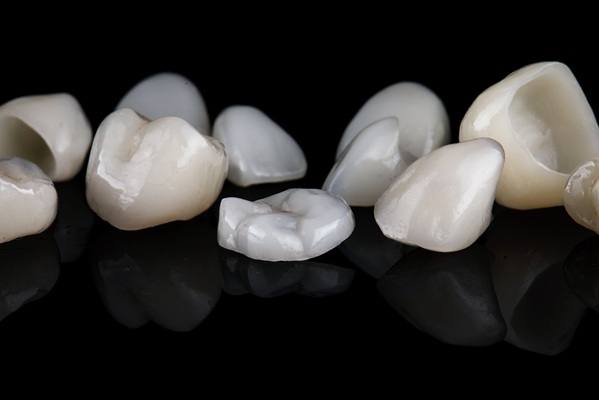The FAQ’s of Gold Dental Crowns

Gold dental crowns are a type of restoration that sits over the entirety of a severely decayed or damaged tooth. The purpose of these restorations is to provide much-needed support and protection to weakened teeth. Today, dental crowns come in a variety of materials, but once upon a time, gold was one of just a few options from which patients could choose. It prevails today as a standard material because of its durability, one factor that heavily influences the type of restorations people get.
The most frequently asked questions regarding gold dental crowns
Gold dental crowns are a contradiction in and of themselves. Thanks to the addition of other materials, gold crowns are durable, making them the best material choice for restorations on the back teeth. However, because of the inherently soft nature of gold, it does not harm the adjacent or opposing teeth as many tougher restorations do. While for aesthetic reasons gold is not the choice material for patients, many dentists continue to recommend it. If a dentist does recommend it, the patient may have several questions before agreeing to a gold crown.
What are the advantages of gold dental crowns?
Aside from appearances, gold crowns offer several advantages with which other types of restoration materials cannot compete. Some top advantages of choosing gold over other silver, amalgam, porcelain, or another material include the following:
- Longevity – gold crowns last for decades
- Perfect fit – other types of materials tend to shrink over time
- Better overall health – the body tolerates gold better than any other material
- Gentle on other teeth – gold does not wear the opposing teeth
- Stain-proof – gold does not stain or become rough over time
Are there disadvantages to getting gold crowns?
There are two major disadvantages of choosing gold over another type of filling material. The first is appearances. Gold restorations stand out and make it obvious that a person had dental work done. The second drawback is cost. Gold is an expensive metal. By that, gold dental crowns are expensive.
What is the lifespan of a gold crown?
With the right care, gold crowns can last anywhere from 15 to 20 years. However, several factors affect a gold crown’s longevity, including the health of the natural tooth being covered, whether one smokes or drinks alcohol, how frequently one brushes their teeth, and the types of food one eats, to name a few.
How much do gold crowns cost?
The cost of gold dental crowns depends on several factors, including the metal’s current market rate, the size of the restoration needed, and a dentist’s service rates. Patients should prepare to spend as much as $2,500 per gold crown. With insurance, that price may decrease by half.
What other materials are in gold dental crowns?
Alone, gold is not strong enough to serve as a dental restoration. For this reason, dental labs combine metal with other, more durable materials. Materials commonly combined with gold to make crowns include nickel, palladium, and chromium. Each of these materials helps to increase the strength of restorations and reduce their cost.
Conclusion
Though not a favored option, gold dental crowns offer several benefits that restorations made from other materials cannot offer. Patients who need restorations — especially on the back teeth — should consult with a dentist regarding the benefits of gold crowns.
Request an appointment here: https://hemetdentalcenter.com or call Hemet Dental Center: Brian Stiewel DDS, INC. at (951) 707-4366 for an appointment in our Hemet office.
Check out what others are saying about our dental services on Yelp: Dental Crowns and Dental Bridges in Hemet, CA.
Recent Posts
Dental crowns are a common restorative solution that protects damaged teeth, improves appearance, and restores proper function. The placement process follows a common step-by-step restoration. Understanding this process can help alleviate any uncertainty you may have before an upcoming appointment and prepare you for what you can expect. Each stage of the dental crown placement…
Dental crowns are often costly and require that a dentist remove a significant amount of the tooth's structure to place them. Read on to learn about dental crown alternatives. Other treatment alternatives are sometimes available that are either less expensive or significantly less invasive. Dental crowns are frequently used to restore severely damaged teeth.The following…
Teeth that are severely decayed or fractured may benefit from dental crowns, which cover the damaged portions of the teeth, protecting them and restoring their functionality. A dental crown is crafted to fit the remaining portion of the tooth exactly and permanently bond to it. However, crowns are not perfect, and while they are usually…
A dental crown is often the best option to repair the affected area when a patient is dealing with severe tooth damage or decay. Dental crowns can also protect weak or brittle teeth, improve the patient's appearance, and correct many other dental issues. For many people, this type of treatment helps to both restore and…


